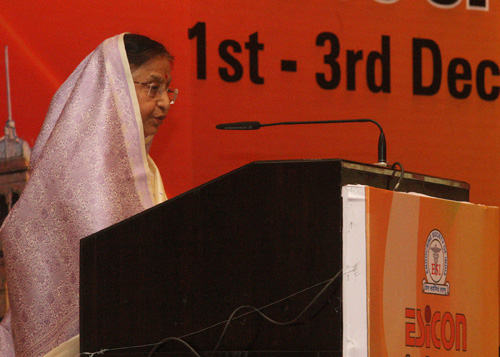Speech By Her Excellency The President Of India, Shrimati Pratibha Devisingh Patil At The Inauguration Of The 41st Conference Of The Endocrine Society Of India At Pune, Maharashtra
Pune, Maharashtra : 01.12.2011

Ladies and Gentlemen,
I am happy to inaugurate the 41st Annual Conference of the Endocrine Society of India, which was formed in 1971, with the aim to promote training and research in basic, clinical and applied endocrinology. The purpose of this Conference is to provide a platform to discuss new medical advances, and to share experiences in medical practice in this field, as also to look at how to contribute to the health needs of the people at large. I hope that all participants will gain from the discussions that take place in this forum.
The trend over the past decades in the world and India has shown that with considerable success in controlling many communicable diseases, we are now facing a challenge in the area of non-communicable diseases, which includes endocrine disorders. This has lead to some suggesting that the 7 billionth person of this planet is more likely to be susceptible to non-communicable diseases. The onslaught of these diseases and their complications can be disabling, and have a considerable economic impact, both to the well-being of individuals and to the welfare of societies. We need to focus on the prevention and control of non-communicable diseases.
The endocrine system and its diseases, hormones and metabolism, has become a distinct and crucial field of specialization. Hormones produced by endocrine glands have many different functions, and several effects on the functioning of different organs in our bodies. Malfunctioning of these glands could lead to hormone deficiency or hormone excess. These can result in conditions like thyroid disorders, diabetes and osteoporosis.
The World Health Organization has estimated that 220 million people worldwide have diabetes, and this figure is projected to double by the year 2030. India now has about 50 million people with type 2 diabetes, more than any other nation. Osteoporosis, the single largest cause for spinal fractures, is expected to impact over 36 million people, a majority of them women. Moreover, over 40 million Indians - 60 percent of them women - suffer from thyroid related disorders. What is most alarming about these disorders in India is that they are usually diagnosed very late, if at all. Awareness is very low and often the symptoms are confused with other disorders.
Our health system must assume the responsibility of not only treating people, but also advising and guiding them about how to deal and indeed, prevent some of these medical conditions. The focus should be on prevention and early diagnosis of disease. Many of the prominent non-communicable diseases are often linked with unhealthy diet and lack of physical activity. It requires change in life style, so that they can be largely prevented and controlled. Taking care of one's health should be given attention to by individuals, by adopting a healthy and balanced life style. Regular exercise and a balanced diet are important in preventing such diseases and, we must always remember, that prevention is better than cure. Regular campaigns should be organized by the Government and institutions to create awareness among people on a wide scale.
In respect of endocrine diseases, progress has been made in the field of diagnosis, such as using newer techniques of hormone estimation and bone scans. Simultaneously, modern technology has enabled doctors to use synthetic molecules like insulin and growth hormones to treat these. Because of the delicate nature of the endocrine system, it is beneficial to only use the least invasive treatment methods possible to achieve therapeutic results. Limiting factors in practice of endocrinology still are the inadequacy of investigational facilities, like hormonal assays and nuclear scans. Such facilities need to be established for easy accessibility and affordability.
Great strides are being made in medical research and disease management. Identifying newer medicines and more effective ways of treatment with minimum side effects should be the constant endeavour of medical research and medical practitioners. The best health services can only be made available, if medical institutions and doctors keep themselves abreast of the latest developments in the medical field. India is a place where many solutions and innovations for improved health can be realized - given our academic, scientific, technical and industrial capital and prowess. India should be taken as a major destination and a partner by international organizations engaged in medical research and disease management. Our pharmaceutical industry has been a global hub for vaccines and anti-retroviral production, and helped the developing world in meeting its requirements at an affordable cost. India now aims to give a major thrust to developing affordable health technologies - from biomedical equipment, diagnostics, implants, devices, new drugs and vaccines; to the use of Information and Communication Technology for health. I call on the Endocrine Society to step up their research efforts. India has the unique advantage of having medical talent of a very high order - what we need is higher a commitment from medical professionals to contribute to society as a whole, on health related matters.
Given the enormity of the challenge facing the nation in diseases related to endocrinology on one side, and the advances in our knowledge, skill and tools on the other, I see this Conference as an opportunity for updating the knowledge base and exchanging information on best practices.
I compliment the Endocrine Society of India for organizing this Conference as community of learning. In the end, I convey my greetings to the delegates and wish all the success to the Conference.
Thank you.
Jai Hind!








